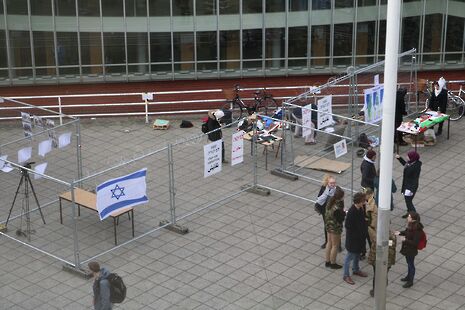PalSoc simulates Israeli checkpoint
A demonstration took place on Monday outside Sidgwick Site

Cambridge University Palestine Society (PalSoc) held a demonstration on Monday at the Sidgwick Site to mark the start of Israeli Apartheid Week.
The demonstration involved “recreat[ing] an Israeli military checkpoint with the aim of raising awareness of the current situation faced by the Palestinian people and Israel’s continued discriminatory and apartheid policies.”
Speaking to Varsity, Anna, President of PalSoc said: “It’s easy to forget that these kinds of issues are happening on a daily basis,” and that the intention behind the simulated checkpoint was to “shake people…out of their lethargy.”
Anna, who does not publicise her surname to preserve her anonymity for potential visa reasons, added: “I think that Cambridge is not a very politically-minded place,” as “people might lose track of what the world is like outside of Cambridge.”
“To me, Palestine is the South Africa of our generation; it’s the thing that we’ll be able to rally around, and ask for justice,” she continued.
Varsity also spoke to Julia, another PalSoc member, who alleged: “people who are active against the government in peaceful protest get put into administrative detention quite frequently, and that’s detention without any kind of trial or charge laid against them, so they often don’t even know why they’ve been arrested in the first place.”
Julia also stated that she hoped that the protest would “help people to understand the emotional dimension of what it means to live in this kind of situation.”
In a statement released alongside the protest, PalSoc claimed: “The word apartheid best describes the situation on the ground when referring to the systematic discrimination against the Palestinian people and Israel’s ongoing efforts to privilege one ethno-religious group over another.”
It also stated: “PalSoc stands in solidarity with the Palestinian people and their struggle, and in doing so, we answer the call of Palestinian civil society to engage in a non-violent campaign of Boycott, Divestment and Sanctions until Israel complies with its obligations under international law.”
According to its website, Israeli Apartheid Week “aims to raise awareness about Israel’s ongoing settler-colonial project and apartheid policies over the Palestinian people.”
Last week, PalSoc boycotted Middle East Peace Week, which was organised by the Israel Society, the Persian Society, the Kurdish Society, Calais Refugee Action Group, and One Voice, with the intention of creating a dialogue between societies that “all strive for one goal – a better Middle East.”
However, PalSoc questioned the timing of Middle East Peace Week, alleging that it was intended to overshadow Israeli Apartheid Week.
Assumed to be in response to PalSoc’s protest, the Israel Society claimed in a Facebook post sharing the last Middle East Peace Week event that it was “opting for meaningful discussion and conducive dialogue rather than inaccurate amateur dramatics, as others have sadly opted for today”.
Speaking to Varsity, Joel Collick, Co-President of the Israel Society, stated: “It’s a shame that PalSoc chose not to partake in the cross-society initiative, Middle East Peace Week, but instead opted for inaccurate amateur dramatics.”
He added: “sadly, this is indicative of their longer-term approach of refusal to engage in dialogue and for the sake of performing inappropriate public displays, as seen last term in their decision to protest against Yiftah Curiel’s attendance at the Cambridge Union.”
Additional reporting by Clara van Wel.
 News / Uni commits to partial arms divestment after year-long review20 October 2025
News / Uni commits to partial arms divestment after year-long review20 October 2025 Arts / Why Cambridge’s architecture never lives up to the ‘dark academia’ dream 17 October 2025
Arts / Why Cambridge’s architecture never lives up to the ‘dark academia’ dream 17 October 2025 Lifestyle / My third year bucket list17 October 2025
Lifestyle / My third year bucket list17 October 2025 News / How much does your college master earn?17 October 2025
News / How much does your college master earn?17 October 2025 Comment / Nathan Cofnas shouldn’t be silenced 20 October 2025
Comment / Nathan Cofnas shouldn’t be silenced 20 October 2025










